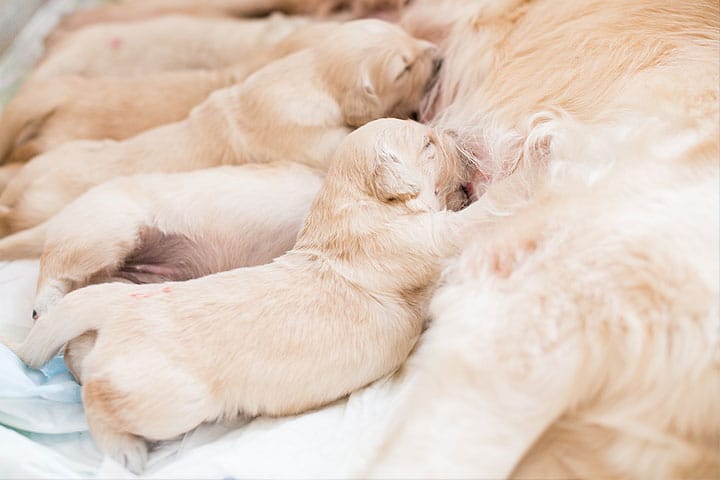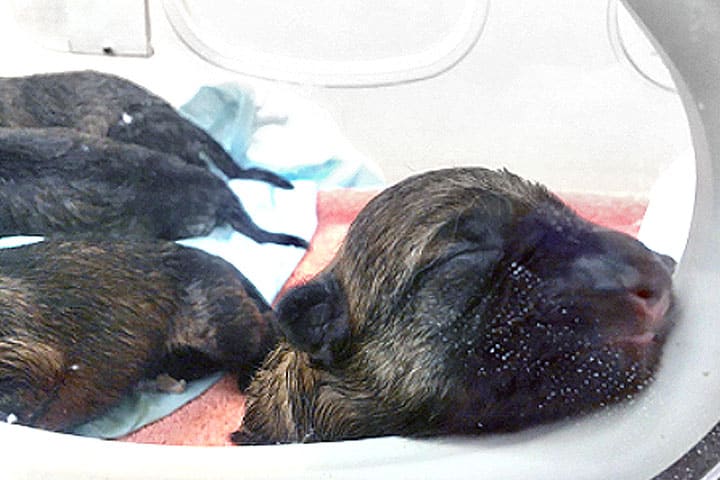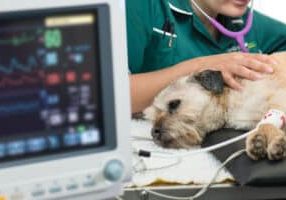
When considering an anaesthetic protocol for a C-section, it’s important to first understand the physiologic changes associated with pregnancy and to minimise foetal effects of anaesthetic drugs in order to minimise foetal respiratory, central nervous system and cardiovascular depression and deliver healthy puppies.
Objectives
- Maintain uterine perfusion
- Rapid extraction of the puppies
- Provide analgesia and minimise depression of the mother
- Provide initial neonatal care
Main physiological changes in pregnant dogs
Increased Plasmatic Volume
- Diluted anaemia with a compensatory increase of the cardiac output: will be common to find lower haematocrit, relative hypalbuminaemia, increased heart rate and increased volume of distribution for the drugs administered.
Increased Intra-Abdominal Pressure
- Depending on the number and size of the puppies and volume of fluid within the amniotic sac, there will be a different degree of increased intra-abdominal pressure.
Resulting in: - Anterior displacement of the diaphragm resulting in a compression of the lungs field and reduction of the functional residual capacity promoting pulmonary collapse and atelectasis
- Compression of the caudal vena cava and abdominal aorta (especially when the patient is positioned in dorsal recumbency for the surgery).
- Compression of the stomach and promotion of oesophageal regurgitation.
Increased Progesterone and Endogenous Endorphine Levels
- The main consequences for the mother will be:
- Delay on the gastric emptying and gastric cardiac tone resulting in higher risk of oesophageal regurgitation
- Sedative effects resulting in lower anaesthetic requirements
- Analgesic effects helping in controlling the nociception and pain.
Anaesthetic Considerations
- Avoid stress, deep sedation or emetic agents on premedication
- Provide oxygen supplementation (preferable by face mask; if the patient tolerates it)
- Anticipate regurgitation (suction systems ready if possible)
- Intubate in sternal recumbency and holding the head above the stomach
- Consider the drugs administered as they can have an impact on the foetal perfusion or newborn puppies (such as respiratory depression)
- Provide analgesia to the mother
- Rapid course of events from induction to delivery of the puppies.
A general suggested Drug Protocol could consist of:
- Premedication
- OPTION 1:
Low dose methadone (0.1 mg/kg intramuscular/intravenous route). - OPTION 2:
Pethidine (5 mg/kg ONLY intramuscular route). - Induction (remember preoxygenation and have suction systems ready!)
- OPTION 1:
Propofol (2-4 mg/kg intravenous route). - OPTION 2:
In cases of depressed animals we can administer Fentanyl (2 mcg/kg intravenous route) prior the propofol to avoid higher doses of induction agents. - Maintenance
- Isoflurane (1-1.5% expired fraction) or sevoflurane (2-2.5% expired fraction).
- Analgesia
- OPTION 1:
Additional methadone 0.1 mg/kg and consider low dose NSAIDs (once the puppies are out of the mother). - OPTION 2:
Lumbosacral epidural with local anaesthetics (only if the technique does not delay the procedure and the animal has cardiovascular stability).
Keep it easy! And use drugs you are familiar with if possible (unless they are contraindicated).
General Management of the Newborn
- Clear the airways and rub them gently to stimulate breathing (if there is only one person managing the puppies be aware that time management and puppy assessment might be crucial for prioritising the tasks and improve the overall litter survival).
- Once they are breathing, provide active warming (patient incubators could be a good idea! Otherwise improvise but remember not to burn the puppies!).
Consider the administration of sublingual opioid antagonists (naloxone 0.01 mg/kg) if respiratory depression associated with the administration of opioids to the mother is suspected.
Oxygen supplementation might help in some cases although its relevance in these cases is still a topic of debate.

Case Advice or Arranging a Referral
If you are a veterinary professional and would like to discuss a case with one of our team, or require pre-referral advice about a patient, please call 01883 741449. Alternatively, to refer a case, please use the online referral form
About The Discipline
Anaesthesia

Need case advice or have any questions?
If you have any questions or would like advice on a case please call our dedicated vet line on 01883 741449 and ask to speak to one of our Anaesthesia team.
Advice is freely available, even if the case cannot be referred.
Anaesthesia and Analgesia Team
Our Anaesthesia and Analgesia Team offer a caring, multi-disciplinary approach to all medical and surgical conditions.